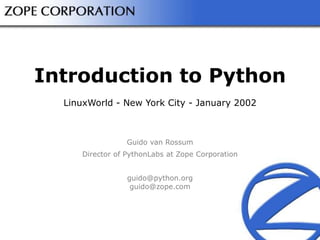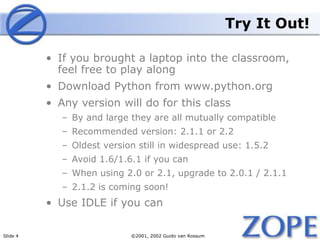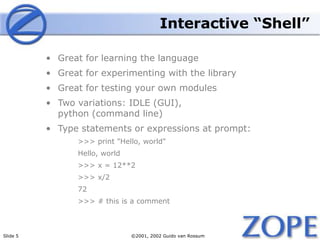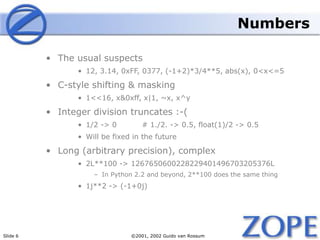This document provides an introduction and overview of the Python programming language. It outlines the key topics that will be covered in the tutorial, including basic data types, control structures, functions, classes and objects, modules and packages, and exceptions. The tutorial encourages attendees to follow along by downloading and using Python on their laptops. It also demonstrates some basic Python concepts through examples in the interactive shell.






![Slide 7 ©2001, 2002 Guido van Rossum
Strings
• "hello"+"world" "helloworld" # concatenation
• "hello"*3 "hellohellohello" # repetition
• "hello"[0] "h" # indexing
• "hello"[-1] "o" # (from end)
• "hello"[1:4] "ell" # slicing
• len("hello") 5 # size
• "hello" < "jello" 1 # comparison
• "e" in "hello" 1 # search
• "escapes: n etc, 033 etc, if etc"
• 'single quotes' """triple quotes""" r"raw strings"](https://image.slidesharecdn.com/intro22-240311162151-586b09db/85/introduction-to-python-fundamentals-and-basics-7-320.jpg)
![Slide 8 ©2001, 2002 Guido van Rossum
Lists
• Flexible arrays, not Lisp-like linked lists
• a = [99, "bottles of beer", ["on", "the", "wall"]]
• Same operators as for strings
• a+b, a*3, a[0], a[-1], a[1:], len(a)
• Item and slice assignment
• a[0] = 98
• a[1:2] = ["bottles", "of", "beer"]
-> [98, "bottles", "of", "beer", ["on", "the", "wall"]]
• del a[-1] # -> [98, "bottles", "of", "beer"]](https://image.slidesharecdn.com/intro22-240311162151-586b09db/85/introduction-to-python-fundamentals-and-basics-8-320.jpg)
![Slide 9 ©2001, 2002 Guido van Rossum
More List Operations
>>> a = range(5) # [0,1,2,3,4]
>>> a.append(5) # [0,1,2,3,4,5]
>>> a.pop() # [0,1,2,3,4]
5
>>> a.insert(0, 42) # [42,0,1,2,3,4]
>>> a.pop(0) # [0,1,2,3,4]
5.5
>>> a.reverse() # [4,3,2,1,0]
>>> a.sort() # [0,1,2,3,4]](https://image.slidesharecdn.com/intro22-240311162151-586b09db/85/introduction-to-python-fundamentals-and-basics-9-320.jpg)
![Slide 10 ©2001, 2002 Guido van Rossum
Dictionaries
• Hash tables, "associative arrays"
• d = {"duck": "eend", "water": "water"}
• Lookup:
• d["duck"] -> "eend"
• d["back"] # raises KeyError exception
• Delete, insert, overwrite:
• del d["water"] # {"duck": "eend", "back": "rug"}
• d["back"] = "rug" # {"duck": "eend", "back": "rug"}
• d["duck"] = "duik" # {"duck": "duik", "back": "rug"}](https://image.slidesharecdn.com/intro22-240311162151-586b09db/85/introduction-to-python-fundamentals-and-basics-10-320.jpg)
![Slide 11 ©2001, 2002 Guido van Rossum
More Dictionary Ops
• Keys, values, items:
• d.keys() -> ["duck", "back"]
• d.values() -> ["duik", "rug"]
• d.items() -> [("duck","duik"), ("back","rug")]
• Presence check:
• d.has_key("duck") -> 1; d.has_key("spam") -> 0
• Values of any type; keys almost any
• {"name":"Guido", "age":43, ("hello","world"):1,
42:"yes", "flag": ["red","white","blue"]}](https://image.slidesharecdn.com/intro22-240311162151-586b09db/85/introduction-to-python-fundamentals-and-basics-11-320.jpg)

![Slide 13 ©2001, 2002 Guido van Rossum
Tuples
• key = (lastname, firstname)
• point = x, y, z # parentheses optional
• x, y, z = point # unpack
• lastname = key[0]
• singleton = (1,) # trailing comma!!!
• empty = () # parentheses!
• tuples vs. lists; tuples immutable](https://image.slidesharecdn.com/intro22-240311162151-586b09db/85/introduction-to-python-fundamentals-and-basics-13-320.jpg)

![Slide 15 ©2001, 2002 Guido van Rossum
Reference Semantics
• Assignment manipulates references
• x = y does not make a copy of y
• x = y makes x reference the object y references
• Very useful; but beware!
• Example:
>>> a = [1, 2, 3]
>>> b = a
>>> a.append(4)
>>> print b
[1, 2, 3, 4]](https://image.slidesharecdn.com/intro22-240311162151-586b09db/85/introduction-to-python-fundamentals-and-basics-15-320.jpg)
![Slide 16 ©2001, 2002 Guido van Rossum
a
1 2 3
b
a
1 2 3
b
4
a = [1, 2, 3]
a.append(4)
b = a
a 1 2 3
Changing a Shared List](https://image.slidesharecdn.com/intro22-240311162151-586b09db/85/introduction-to-python-fundamentals-and-basics-16-320.jpg)

![Slide 18 ©2001, 2002 Guido van Rossum
Control Structures
if condition:
statements
[elif condition:
statements] ...
else:
statements
while condition:
statements
for var in sequence:
statements
break
continue](https://image.slidesharecdn.com/intro22-240311162151-586b09db/85/introduction-to-python-fundamentals-and-basics-18-320.jpg)




![Slide 23 ©2001, 2002 Guido van Rossum
Example Class
class Stack:
"A well-known data structure…"
def __init__(self): # constructor
self.items = []
def push(self, x):
self.items.append(x) # the sky is the limit
def pop(self):
x = self.items[-1] # what happens if it’s
empty?
del self.items[-1]
return x
def empty(self):
return len(self.items) == 0 # Boolean result](https://image.slidesharecdn.com/intro22-240311162151-586b09db/85/introduction-to-python-fundamentals-and-basics-23-320.jpg)
![Slide 24 ©2001, 2002 Guido van Rossum
Using Classes
• To create an instance, simply call the class object:
x = Stack() # no 'new' operator!
• To use methods of the instance, call using dot
notation:
x.empty() # -> 1
x.push(1) # [1]
x.empty() # -> 0
x.push("hello") # [1, "hello"]
x.pop() # -> "hello" # [1]
• To inspect instance variables, use dot notation:
x.items # -> [1]](https://image.slidesharecdn.com/intro22-240311162151-586b09db/85/introduction-to-python-fundamentals-and-basics-24-320.jpg)
![Slide 25 ©2001, 2002 Guido van Rossum
Subclassing
class FancyStack(Stack):
"stack with added ability to inspect inferior stack items"
def peek(self, n):
"peek(0) returns top; peek(-1) returns item below that; etc."
size = len(self.items)
assert 0 <= n < size # test precondition
return self.items[size-1-n]](https://image.slidesharecdn.com/intro22-240311162151-586b09db/85/introduction-to-python-fundamentals-and-basics-25-320.jpg)



![Slide 29 ©2001, 2002 Guido van Rossum
Modules
• Collection of stuff in foo.py file
– functions, classes, variables
• Importing modules:
– import re; print re.match("[a-z]+", s)
– from re import match; print match("[a-z]+", s)
• Import with rename:
– import re as regex
– from re import match as m
– Before Python 2.0:
• import re; regex = re; del re](https://image.slidesharecdn.com/intro22-240311162151-586b09db/85/introduction-to-python-fundamentals-and-basics-29-320.jpg)





![Slide 35 ©2001, 2002 Guido van Rossum
File Objects
• f = open(filename[, mode[, buffersize])
– mode can be "r", "w", "a" (like C stdio); default "r"
– append "b" for text translation mode
– append "+" for read/write open
– buffersize: 0=unbuffered; 1=line-buffered; buffered
• methods:
– read([nbytes]), readline(), readlines()
– write(string), writelines(list)
– seek(pos[, how]), tell()
– flush(), close()
– fileno()](https://image.slidesharecdn.com/intro22-240311162151-586b09db/85/introduction-to-python-fundamentals-and-basics-35-320.jpg)

![Slide 37 ©2001, 2002 Guido van Rossum
Python 2.0: What's New
• Augmented assignment: x += y
• List comprehensions:
[s.strip() for s in f.readlines()]
• Extended print: print >>sys.stderr, "Hello!"
• Extended import: import foo as bar
• Unicode strings: u"u1234"
• New re implementation (faster, Unicode)
• Collection of cyclic garbage
• XML, distutils](https://image.slidesharecdn.com/intro22-240311162151-586b09db/85/introduction-to-python-fundamentals-and-basics-37-320.jpg)




